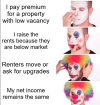- Joined
- May 2, 2002
- Professional Status
- Certified General Appraiser
- State
- Arkansas
I have some good comps considering small strip malls are not all that common and popular. I am doing a 15,300 SF U shaped mall, good Hwy location in a 50k town. I have a similar comp that is same kind of construction similar location about a mile away and it sold for about $100/SF. Couple other sales somewhat newer sold about $120/SF. The sales and cost came is close but the income is much lower.
The rents are $4-6 less than advertised local rents, but many of these strip centers have a lot of vacant spots. The manager and the owner (deceased) chose to go with higher occupancy rates and lower rents. Single net lease, but renter pays for any ungrades in the store. Some renters go back to 2003.
The dilemma I face is the trade off. Market rents are higher, so is vacancy. And under the market conditions, small retail shops are not performing well. The complex has a dry cleaners, Mexican cafe, a nail salon , a stylist, a computer repair, another stylist, and a sports card and toy store, plus a small ethnic food store. Even bumping up rents substantially is likely to create vacancy, or renters demanding new carpet, or other upgrades.
The newer stores (post 2014 or so) have much higher rents but all of them seem to be churning a lot of renters. But buyers seem eager to pay well above what income would say they should want to pay. I am not seeing the economics of this. Talking with an 82 year-old property manager laid out the owner's philosophy and also told me of similar strip centers where vacancy was high. I had to sort of do a drive by estimate of vacancy, but he is right, there are a lot of vacant buildings and for rent signs around. I don't think this reflects the local economy which is booming, rather seems to reflect the competition from on line services. Only the sort of businesses found in this center seem to be thriving. Personal care products, niche products, or restaurants which have mostly recovered from the pandemic.
At this point, I will use market rents that are somewhat higher than the actual ($7/SF) but much less than the advertised $14-18/SF properties. Only a DG or similar high volume business is paying that much in this town. Any suggestions?
The rents are $4-6 less than advertised local rents, but many of these strip centers have a lot of vacant spots. The manager and the owner (deceased) chose to go with higher occupancy rates and lower rents. Single net lease, but renter pays for any ungrades in the store. Some renters go back to 2003.
The dilemma I face is the trade off. Market rents are higher, so is vacancy. And under the market conditions, small retail shops are not performing well. The complex has a dry cleaners, Mexican cafe, a nail salon , a stylist, a computer repair, another stylist, and a sports card and toy store, plus a small ethnic food store. Even bumping up rents substantially is likely to create vacancy, or renters demanding new carpet, or other upgrades.
The newer stores (post 2014 or so) have much higher rents but all of them seem to be churning a lot of renters. But buyers seem eager to pay well above what income would say they should want to pay. I am not seeing the economics of this. Talking with an 82 year-old property manager laid out the owner's philosophy and also told me of similar strip centers where vacancy was high. I had to sort of do a drive by estimate of vacancy, but he is right, there are a lot of vacant buildings and for rent signs around. I don't think this reflects the local economy which is booming, rather seems to reflect the competition from on line services. Only the sort of businesses found in this center seem to be thriving. Personal care products, niche products, or restaurants which have mostly recovered from the pandemic.
At this point, I will use market rents that are somewhat higher than the actual ($7/SF) but much less than the advertised $14-18/SF properties. Only a DG or similar high volume business is paying that much in this town. Any suggestions?

